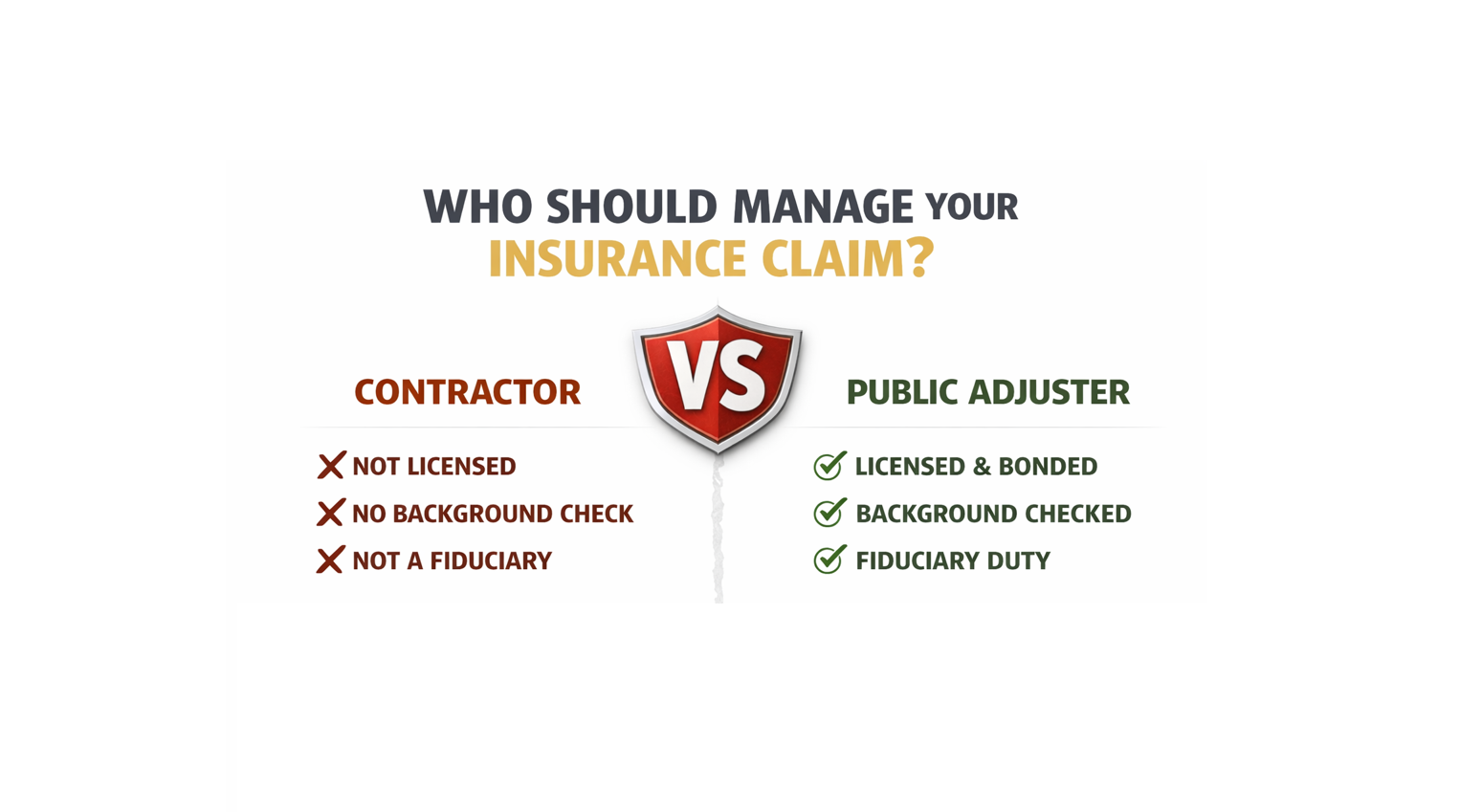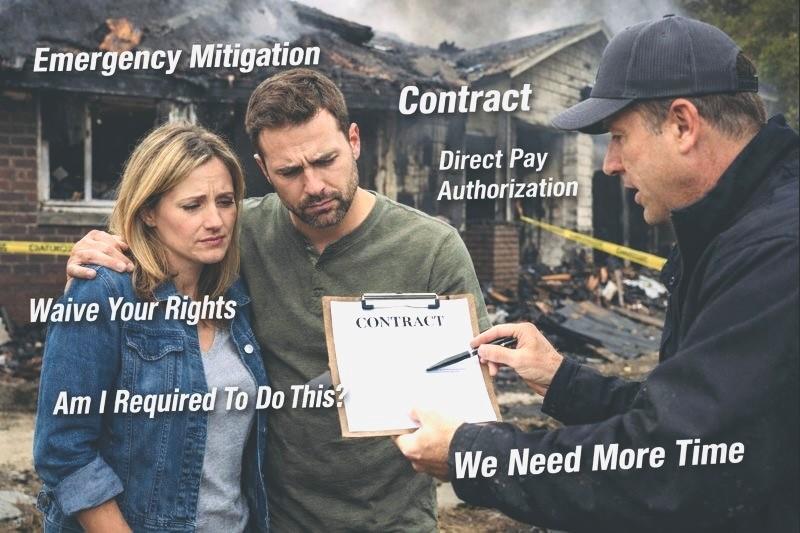The Takeaways
-
Texas Insurance Code 4102.163 prohibits contractors from acting as public adjusters or advertising that they adjust claims; they may not negotiate, interpret coverage, or settle your claim
-
Contractors are not required to be licensed in Texas; Public Adjusters are licensed, regulated, and bonded to represent you.
-
Insurers pay by covered scope and pricing, not contractor estimates. Inflated estimates lead to denied claims and possible liens on your property.
-
Starting with a PA reduces unpaid change orders, delays, and scope gaps that happen when contractors “handle the claim.”
-
The correct process order for handling a complex insurance loss is to document the loss, align with the policy, negotiate scope and pricing, and then interview contractors
Can A Contractor Do What A Public Adjuster Does?
Over the years, potential clients have asked us in one form or another, “My contractor said they can handle everything with the insurance company just like a public adjuster, and that a PA only takes money from my claim. Is that true?”
The short answer is, “No.” It is not true in Texas, and it is not how the insurance process works anywhere it is done correctly. Yet you will hear this pitch often, especially from “fire chaser” contractors who rush to a loss and try to sign work on the spot. They will say they can write the estimate, do the testing, handle contents, create reports, argue with the adjuster, and “get you paid” without involving a PA. When pressed, some even suggest using a PA only at the very end to chase the last few thousand dollars.
There are three core problems with that pitch. First, Texas law draws a bright line between construction and claim adjusting. Second, insurers do not have to deal with your contractor at all, and frequently stop engaging once a contractor crosses the line. Third, the incentives are different. A contractor’s business is building. A public adjuster’s business is adjusting the claim. Confusing the two usually leads to scope gaps, coverage mistakes, delays, and fights over money that could have been avoided.
What the law actually says about contractors and claims
Texas Insurance Code 4102.163 was added to make this bright line unmistakable. The law prohibits a contractor from acting as a public adjuster or advertising that they adjust claims for any property where they may provide contracting services. In plain English, a contractor cannot negotiate your insurance claim, interpret coverage, or attempt to settle any part of your claim. They also cannot put “we’ll handle your claim” front and center in their marketing when what they are really selling is construction.
Here is a brief reference to the statute’s core idea:
Excerpt: A contractor may not act as a public adjuster or advertise to adjust claims for any property for which the contractor is providing or may provide contracting services.
That is the legal boundary. On the right side of that boundary, contractors can talk scope and methods specific to their trade. On the wrong side, they are practicing adjusting without a license.
What a contractor can do vs what a Public Adjuster does
It helps to separate responsibilities.
A contractor can:
-
Inspect the structure to understand damage and the feasibility of repairs
-
Propose a scope of work and methodology for reconstruction and remediation
-
Provide a construction estimate, schedule, and subcontractor plan
-
Execute the agreed repairs after funding is aligned and approvals are in place
A Public Adjuster can:
-
Represent you, the insured, in all aspects of the property claim
-
Interpret coverage, limits, deductibles, code upgrades, and policy conditions
-
Build a complete damage model, including structure, contents, specialty cleaning, and time element coverages like Additional Living Expense
-
Prepare and reconcile detailed estimates and supplements that align with policy language and building codes
-
Negotiate line items, quantities, pricing, depreciation, and recoverable amounts, and ultimately settle the claim on your behalf
Contractors may contribute technical details on how to reconstruct. Public adjusters align those details with coverage, law, codes, pricing methodology, and the order of operations required to actually get paid correctly. When a contractor claims they can do “everything a PA does,” they are either misunderstanding the job or asking you to let them step into a role they are not licensed to perform.
Why insurers often sidestep contractors
Adjusting is a legal and financial process, not a construction bidding contest. Carriers pay based on the covered scope of damage at covered pricing, not based on the contractor’s preferences. They will often listen to contractor input as a courtesy to avoid surprises in the field. But when a contractor becomes adversarial, attempts to negotiate coverage, or tries to settle parts of the claim, the insurer can simply stop engaging and deal directly with the policyholder. That is common, and it leaves you, the insured, stuck in the middle while the project stalls.
A frequent pattern we see:
-
Contractor promises to “handle it all”
-
They submit a construction estimate that mixes legitimate scope with uncovered upgrades or preferences
-
The insurer rejects coverage portions and only engages on narrow line items
-
The contractor becomes frustrated and tells you to “fight them” or “hire a PA now”
-
Months are lost, and leverage is weakened because the process started from the wrong place
-
The contractor places a lien on your house for the difference of his estimate and what the insurance company agrees to pay
The Incentive Problem That No One Mentions
Contractors build. They get paid to put materials in place. Most want to do honest work and move projects forward. But when a contractor controls the claim conversation, they are tempted to inflate the estimate for what they want to build rather than what the policy pays for. That misalignment is where most disputes begin.
A licensed PA begins with the policy, the damage, and the codes. The scope is the output of that process, not the starting point. Done right, this approach avoids unpaid change orders, coverage denials, and stop work moments that turn into finger-pointing between the builder and the carrier while the insured lives in limbo.
Oversight matters in Texas
Texas does not license general contractors at the state level. Certain trades are licensed, like electricians and plumbers, but general restoration contractors operate with minimal oversight compared to Public Adjusters, who must be licensed, bonded, background checked, and educated to maintain their credentials. When someone with minimal oversight tells you they can perform the same function as a licensed fiduciary who is regulated by the Department of Insurance, you should pause.
The critical order of operations after a large loss
When the order is wrong, everything takes longer and costs more. Here is the order that consistently works in Texas fire and water losses:
-
Stabilize and secure. Board-up, temporary fencing, utilities. Keep receipts.
-
Document thoroughly. Photos, video, Matterport, and a room-by-room inventory for structure and contents.
-
Policy alignment. Confirm coverages and limits for dwelling, contents, ALE, debris removal, and code upgrades.
-
Comprehensive scope and estimate. Build the damage model that actually matches policy language and applicable codes.
-
Negotiate approval. Reconcile line items, quantities, pricing, depreciation, and timelines with the carrier.
-
Then hire the builder. Bring in contractors to price and schedule a project that is already aligned with coverage.
When a contractor is engaged at step 2 or 3 and starts negotiating the claim, you are gambling with leverage. When a PA is engaged at step 1, the contractor walks into a funded, organized project with a clear scope and timeline. That is a better outcome for everyone.
Common claims contractors say they can handle, but legally cannot
We routinely hear contractors tell insureds they can:
-
Interpret whether code upgrades are covered or not
-
Argue that certain cleaning or specialty restoration is “required by the policy”
-
Determine ALE eligibility or amounts
-
Decide whether depreciation is recoverable and under what conditions
-
Negotiate coverage denials or partial payments
Those are public adjusting functions. The moment a contractor begins telling you what the policy requires or attempting to change the insurer’s coverage position, they are doing adjuster work without a license.
What if a contractor writes the estimate and a PA comes in later?
Another common pitch goes like this: “Let us write the estimate and get it most of the way done. If there’s anything left, you can bring in a PA for the last few thousand.” It sounds efficient, but in practice, it usually costs you more in the long run. The first scope sets the frame for everything that follows. If that frame misses code items, specialty cleaning, or even basic quantities, adding them later is an uphill fight. Even worse, if the contractor's scope is inflated or just written incorrectly, the carrier may start to question everything. The payment cadence gets locked to that narrow frame, which means slower approvals and delayed draw releases. Change orders begin to stack, and each supplement sits on top of a weak foundation the insurer now views skeptically. While all of that churns, the time value of money runs against you. Approvals stall, depreciation sits unreleased, contents decisions drag, and your costs rise while you wait.
Starting with a PA flips that script. The initial scope reflects what the policy actually owes, and approvals and checks tend to arrive in the right order.
You will also hear familiar lines from “fire chaser” contractors. They’ll say you don’t need a PA and that they will get you more and faster. They’ll promise to handle the insurance company for you, ask you to sign a work authorization today so they can start and fight the carrier later, and claim they can run testing, contents, and reports the carrier has to honor. Some go further and suggest hiring a PA only at the very end if the carrier short pays.
When you hear that, slow down. Ask who is interpreting coverage, who is licensed to negotiate and settle, and what happens if the carrier stops engaging. Then ask them to cite the statute. If the room gets quiet, you have your answer.
Taking Action: The Right Action When Faced With A Large Insurance Loss
When faced with a large insurance loss, the best course of action is to hire a licensed public insurance adjuster from the beginning. If a contractor claims they can “handle, work with, or negotiate” with the insurance company, understand that those are adjusting activities and the law reserves them for licensed adjusters. The contractor’s input will be valuable when it comes time to build, but your leverage, timeline, and final result are stronger when the claim is prepared and negotiated by a professional who is licensed to do it.
If you do not already know a public adjuster, a quick search will reveal the PAs serving your area. Reputable contractors in DFW also know who the credible public adjusters are, and many prefer working on projects where the claim is organized and funded properly before the first swing of a hammer.
If you have questions about what your contractor is saying or doing at any point in your reconstruction process, contact True View Commercial, and one of our licensed experts will provide clear guidance on whether to stay the course or engage a public insurance adjuster. When the stakes are high, you do not have to guess. Start with a professional who is licensed to protect your recovery.
Note: True View Commercial does not practice law or give legal advice. For questions about how the law applies to your claim, contact a trusted attorney.



